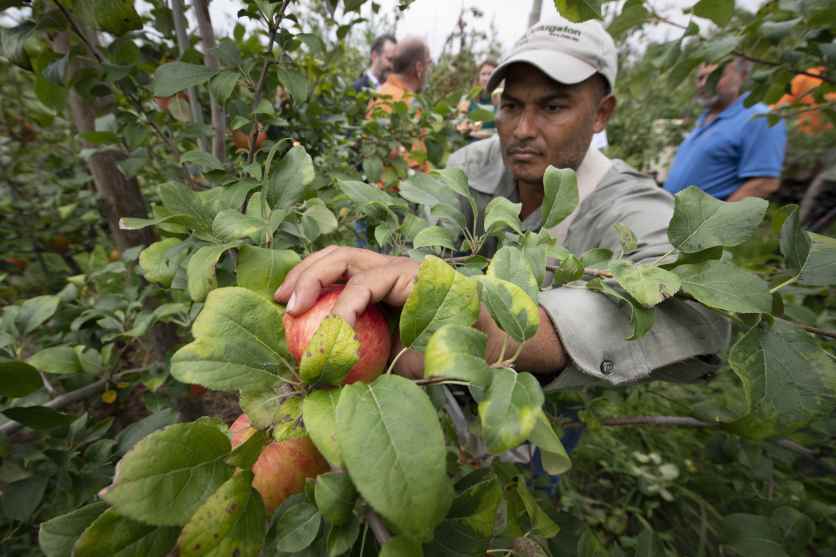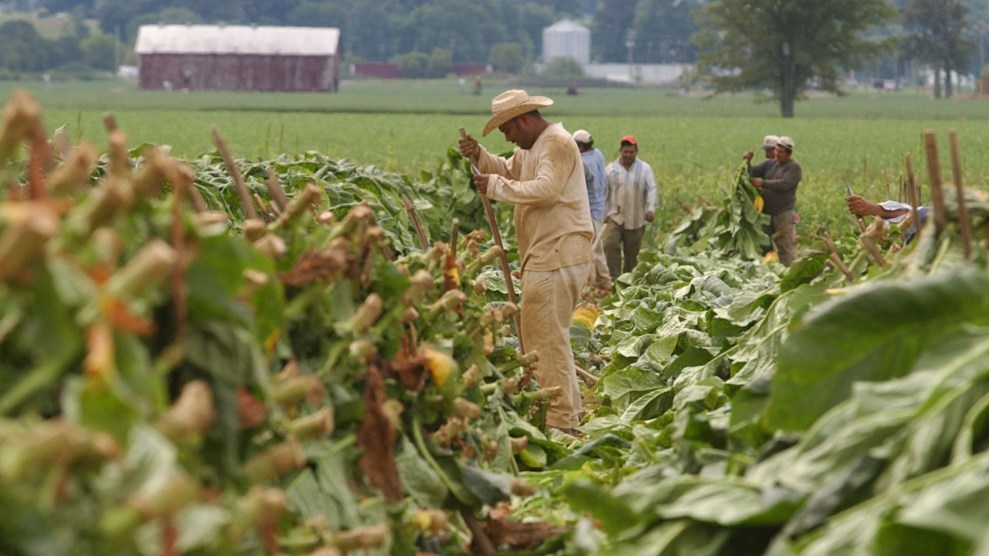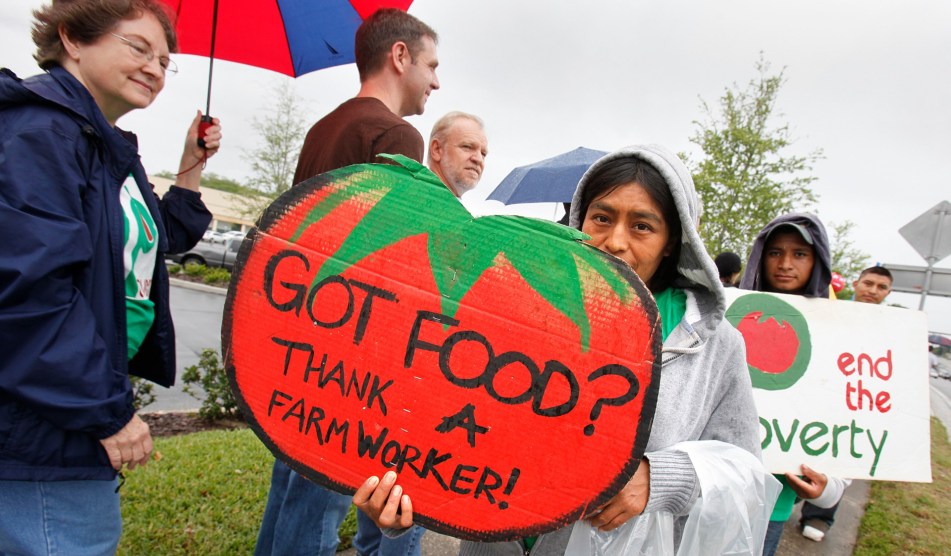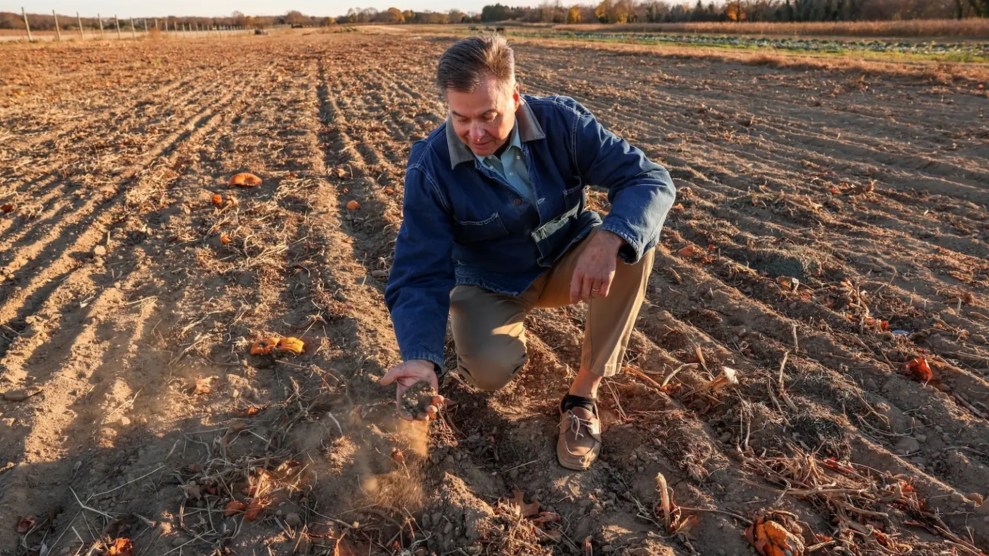
A Honduran migrant worker harvests apples in Aspers, Pennsylvania. August 15, 2019. Lance Cheung/Zuma
Two fathers and their sons traveled from Mexico this spring to grow and harvest North Carolina’s sweet potatoes, tobacco, Christmas trees and other crops. All four men held temporary H-2A nonimmigrant visas—permits US employers use to sponsor foreign guest workers to fill seasonal labor shortages on farms.
In August, one of the fathers died of COVID-19. The other died weeks later. After both were buried in Mexico, their sons dutifully returned to North Carolina to keep working under their visas because they needed the income. The twin tragedies, details of which were confirmed by the Center for Public Integrity through state records and interviews, lay bare the contradictions of the 34-year-old H-2A program.
On one hand, the program provides essential labor for growers and jobs for foreign workers desperate for money. On the other, the program can put workers in arduous, sometimes-deadly, situations: Toiling in excessive heat, living in unsafe housing and, now, exposing themselves to a highly contagious virus.
In just five years, the number of H-2A jobs in America has jumped by 155% to more than 275,400 this year. Foreign workers, mostly from Mexico, benefit from the ability to work legally, albeit temporarily. But advocates have long warned that the workers can be cheated out of wages and treated as expendable because they fear complaining will cost them their visas. Coronavirus outbreaks this year infected many H-2A workers in multiple states.
After investigating the COVID-19 deaths of two H-2A workers, Washington state labor officials fined a large agribusiness company more than $2 million on Dec. 21, accusing it of failing to provide safe conditions. Public Integrity has found three H-2A worker deaths in North Carolina alone that haven’t been publicly disclosed but are under investigation.
Next year, H-2A workers will face a new challenge: a wage freeze, put in place by President Donald Trump’s Department of Labor. Advocates want President-elect Joe Biden to undo the freeze, but the process could take months. They’re also pushing for H-2A and other farmworkers to receive priority access to COVID-19 vaccines given their status as frontline workers, and are urging farms to adopt federal mandates to reduce crowded housing and buses, breeding grounds for virus outbreaks.
“Farmworkers are not beasts of burden. They’re not machines,” said Bruce Goldstein, president of Farmworker Justice in Washington, D.C. and a longtime critic of the guest worker program.
An H-2A worker who survived COVID-19 in North Carolina told Public Integrity that as of mid-December, he still hadn’t been paid for the three weeks he was too sick to work. “It’s been a frightening season for me,” he said. He requested anonymity because he feared jeopardizing his visa.
Essential but overpaid?
The coronavirus was racing through U.S. farms this year even as the State Department was issuing visas to fill a record 275,400 H-2A jobs. A complex web of rules requires employers seeking to hire H-2A workers to prove to their state labor officials that they first advertised for workers who live in the United States. Guest workers can fill more than one H-2A job, but do not have the freedom to quit and choose another employer once they are in the U.S. Many H-2A employers are labor contractors—middlemen who supply workers to farms.
Since there’s no national cap on H-2A worker visas, in theory the program can keep expanding. Visa holders can work for U.S. employers for months at a time, but are required to leave the country when their contracts end. The H-2A program gives them no opportunity to apply to settle in the United States as legal, permanent immigrants.
Earlier this year, Trump exempted H-2A workers as he began shutting down borders because of the pandemic. He said jobs and healthcare should be reserved for Americans. But he allowed in H-2A workers because, he said, they provide “services essential to the United States food supply chain.”
H-2A workers have been estimated at 10% of the U.S. farm labor force. The recent surge has likely boosted that proportion. H-2A workers are now 25% of North Carolina’s seasonal farm labor force and growing, according to Lee Wicker, deputy director of the North Carolina Growers Association. The group supplies H-2A workers to employers and manages a bargaining agreement with the Farm Labor Organizing Committee, a labor union.
Farmers are struggling, Wicker said, because H-2A wages have been rising too fast. If Biden or a pending court challenge block Trump’s wage freeze, Wicker said, growers will push the White House to find another way to slow pay increases.
Federal law requires that labor officials protect both H-2A and U.S.-based workers from practices that push down wages unfairly. But some growers complain that the formula used to calculate pay rates has increased H-2A wages nationally by 21% since 2015—compared to almost 14% increases for U.S. workers overall. Next year, regulators announced, the H-2A minimum wage in North Carolina will be $12.67 an hour. “We’re saying, let’s do a freeze, take a deep breath and let agriculture stabilize,” Wicker said.
Wicker also said that if COVID-19 mandates require more spending on worker housing and buses to reduce crowding, farms could cut H-2A jobs. “Which is worse for [the worker]?” Wicker asked. “Being up here and being potentially exposed and getting COVID? Or being in Mexico poor, broke, and can’t take care of his family?”
In a lawsuit seeking to block the wage freeze, the United Farm Workers union argues that farmworkers, H-2A or not, are among America’s lowest paid workers. The union also says workers need more bargaining power, not less.
The union supports a long-debated bipartisan proposal that the House of Representatives approved a year ago. The proposal would open a path to legal permanent immigrant status for the estimated 50% of U.S.-based farmworkers who are undocumented. It also would reserve 20,000 H-2A visas for year-round farm work for three years, half of those for dairy workers, who are not currently eligible for H-2A visas.
Biden, who has said he approves of the H-2A program generally, supports the House legislation. But the bill’s fate depends on the Senate, which has yet to consider it.
Trump bashes immigrants, likes guest workers
Trump’s interest in the H-2A program stemmed from his embrace of agribusiness as part of his base and his narrow view of who merits the opportunity to legally immigrate to and settle in America. In a January 2019 speech at an American Farm Bureau Federation convention in New Orleans, he vowed to keep “the wrong ones out” with a border wall but make it “easier for them to come in and to work the farms.”
The president has long accused foreign workers of stealing blue-collar jobs from Americans. However, Trump Vineyard Estates in Charlottesville, Virginia, has a history of employing H-2A workers. This year the vineyard requested 23 to work from March to October at $12.67 an hour, H-2A disclosure records show.
Trump’s Labor Department tweaked other H-2A rules this year to allow employers, absent state mandates, to move H-2A workers into uninspected housing on an emergency basis to create social distancing. In August, the Department of Homeland Security issued a temporary rule reducing paperwork and wait times so H-2A workers could be transferred faster among employers to protect “the nation’s food supply.”
Fear of blacklisting
The H-2A program’s roots go back to the Bracero program, an agreement with Mexico to fill U.S. labor shortages during World War II. Western farms built a national food-supply chain using Braceros. In 1964, Congress didn’t renew the program because of an outcry over unchecked wage theft and other labor violations by employers. After that, undocumented workers increasingly began filling jobs, arriving seasonally.
Fewer workers are now able to illegally cross the more-fortified border, and deportations of undocumented workers who’ve settled here have led growers to turn more to the H-2A program.
Labor advocates say there are ethical H-2A employers who are concerned about workers’ well-being. But fear of blacklisting and denial of visas remains pervasive. Employers must pay for visas and costs for travel to and from the United States. In addition to housing, employers are also responsible for workers’ transportation to job sites and sometimes provide meals for a price. But most H-2A workers are reluctant to complain when these obligations aren’t met. Even when advocates successfully intervene, dispute resolution can take years.
“I’ve seen people demand rights, and you know what happens? They lose that job. That’s why people just stay quiet,” the worker who survived COVID-19 in North Carolina said.
He said he and other H-2A workers who traveled with him to the state do not believe they were infected with COVID-19 when they arrived from Mexico. They followed instructions to wear masks and gloves and cleaned their barracks daily. Nonetheless, he said, they were infected, possibly by an employee who worked at another farm that had an outbreak. “From one day to the next, I couldn’t get up. I felt like I was going to die,” the worker said. “A lady came from a health clinic and tested us and it turned out we all had the virus.”
Lariza Garzon, executive director of the Episcopal Farmworker Ministry in Dunn, North Carolina, said she has heard multiple reports of workers not getting paid when they were ill with the coronavirus or told to quarantine. Garzon’s organization is asking for cash donations to farmworker families affected by COVID-19, and has wired money to H-2A workers’ families in Mexico. Justin Flores, vice president of the Farm Labor Organizing Committee, is trying to obtain workers’ compensation pay for H-2A workers who fell ill. “One of them came out of the hospital and went back to Mexico using an oxygen tank,” Flores said.
H-2A workers are foreigners on temporary visas. But federal labor officials told Public Integrity that they’re not excluded from the Families First Coronavirus Response Act, passed in March to support workers who lost income because of COVID-19. The law requires workers receive two weeks’ pay for sick time or if healthcare providers told them to quarantine. Like other workers, H-2A workers could be excluded from the benefit if their employers have more than 500 employees.
Demands for transparency
To better track the price H-2A workers are paying as essential workers, advocates would like the North Carolina Department of Health and Human Services to publicly acknowledge their deaths even if they won’t disclose the victims’ names.
The department releases tallies of virus cases and deaths among residents in congregate housing if a facility has 10 or more residents. As tallies are updated, prior records disappear. The records omit the names of farms or congregate housing complexes where H-2A workers live. Officials say they do this for the protection of workers, who are at risk of “discrimination and harassment.” A labor advocate troubled by the lack of transparency began saving records as they were posted and showed Public Integrity two dates that matched those of rumored worker deaths. State labor officials confirmed the deaths and said in an email to Public Integrity: “The two fatalities you asked about are being investigated.”
Flores and state labor officials said a third H-2A worker in North Carolina died in mid-December. Like the two sons whose fathers died, the worker’s family didn’t want to discuss his death.
H-2A worker deaths have provoked outcry in other parts of the country.
In northwest Texas, Marco Antonio Galvan Gomez, 48, a Mexican worker, died after becoming ill while laboring for a potato grower and treating himself with over-the-counter medications.
In Washington state, Jamaican H-2A worker Earl Edwards, 63, and Mexican Juan Carlos Santiago Rincon, 37, died in July following an outbreak at Gebbers Farms, one of America’s biggest apple and cherry growers. The Okanogan County business employs thousands of H-2A seasonal workers and houses them in barracks. State labor officials fined Gebbers Farms more than $2 million on Dec. 21 after an investigation found the company failed to limit the number of men sleeping in barracks and riding together on company buses.
“He complained that there were too many men in the room,” Marcia Edwards, Earl Edwards’ widow in Jamaica, told Public Integrity. After he and other men received an initial medical exam, Marcia said, her husband wasn’t provided follow-up visits or treatment while he was in isolation in a bunkhouse for infected men. He died two hours after she last spoke to him. “Nobody cared for them,” she said. “They were chucked aside.”
Gebbers Farms expressed sorrow about the men’s deaths, and in a written statement said it’s reviewing options to appeal the fine. “We strongly disagree with the [state labor] agency’s assessment,” the company said. “Gebbers Farms collaborated with an infectious disease specialist early in the pandemic to develop a group-shelter program that put employees’ health, safety and well-being first.”
In an interview, Gebbers Farms spokeswoman Amy Philpott said she couldn’t speak specifically to Marcia Edwards’ allegations. “We did have people checking in on employees who were there [in isolation] on a daily basis, providing them food, providing them water and getting them medical care,” she said.
Attorney Corrie Yackulic, who represents Marcia Edwards, said: “The farmworker visa program is the closest thing we have to indentured servitude in this country.”
Yackulic said Washington state approved a compensation claim for Marcia Edwards. Yackulic is also handling a pending claim on behalf of Rincon’s family.
Before the workers’ deaths, the UFW and Familias Unidas Por Justicia, another labor union, filed suit against Washington state in April arguing that proposals to protect workers — such as confining sick workers to one side of a room—were “egregiously dangerous.” The unions wanted to prohibit the use of bunk beds for farmworkers, saying the beds place workers too close together. The state instead cut the number of bunk beds allowed in a room.
In Santa Barbara County, California, migrant worker Leo Begario Chavez-Alvarado, 51, who drove H-2A workers and bunked with them, died after he and infected co-workers were moved into a hotel to quarantine.
Santa Barbara County Public Health Director Van Do-Reynoso said she realized her department had no idea where much of the area’s H-2A housing was, which complicated contact tracing. She pushed for a public health order in September requiring daily screenings for COVID-19 symptoms in all H-2A housing. Employers can make use of Housing for the Harvest, Do-Reynoso said, a state program that provides farmworkers, including H-2A workers, with free quarantine housing and treatment.
Warning not to retaliate
The North Carolina Department of Health and Human Services has issued “interim guidance” for farm employers with 10 pages of steps to prepare for H-2A workers’ arrival. Farmworkers are a “uniquely vulnerable population,” the advisory warns, whose exposure to pesticides and fungi in crops “might place them at higher risk of severe illness due to COVID-19.”
The guidance reflects lessons learned from tragedy: Prepare written safety plans and supplies. Quarantine new arrivals for 14 days to keep them away from workers already on the ground. Stop using bunk beds and space beds at least six feet apart. Prepare “additional housing” options with separate kitchens and bathrooms for infected workers. Look into a federally supported program that can provide hotel rooms and possibly food to workers who must isolate.
“Identify the nearest healthcare facility that provides free or low-cost care to uninsured people,” the advisory also says. And in a gentle admonishment, the notice advises employers to encourage workers to speak up and assure them “they will not face retaliation for reporting COVID-19 symptoms, seeking testing, seeking care, or bringing an unsafe living or working condition to your attention.”
Garzon, of the Episcopal Farmworker Ministry, worries how the state will fare when a new season starts. Will growers follow the guidance?
“Are we going to be ready for next year?” she said. “Workers start coming in March.”
















